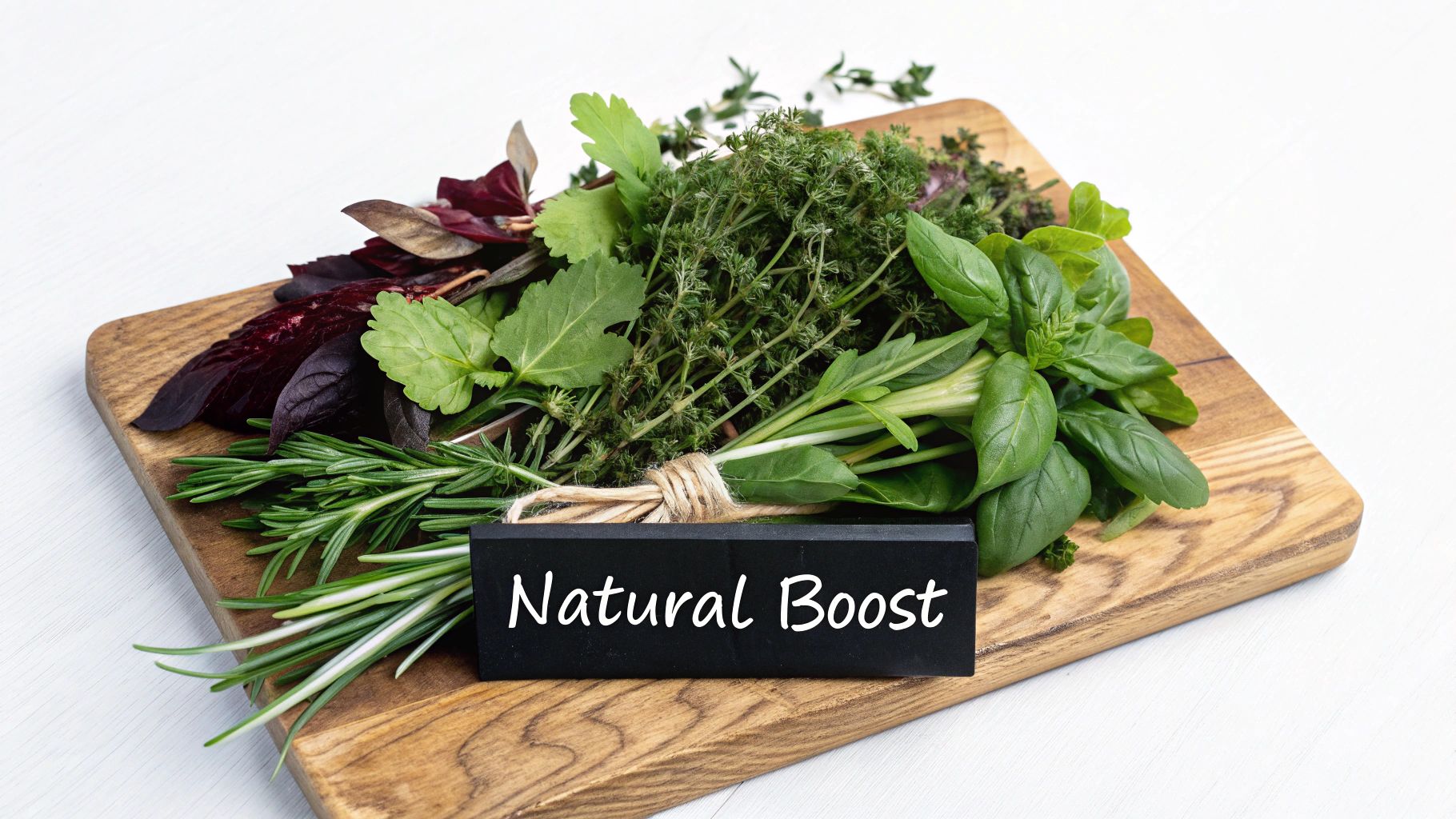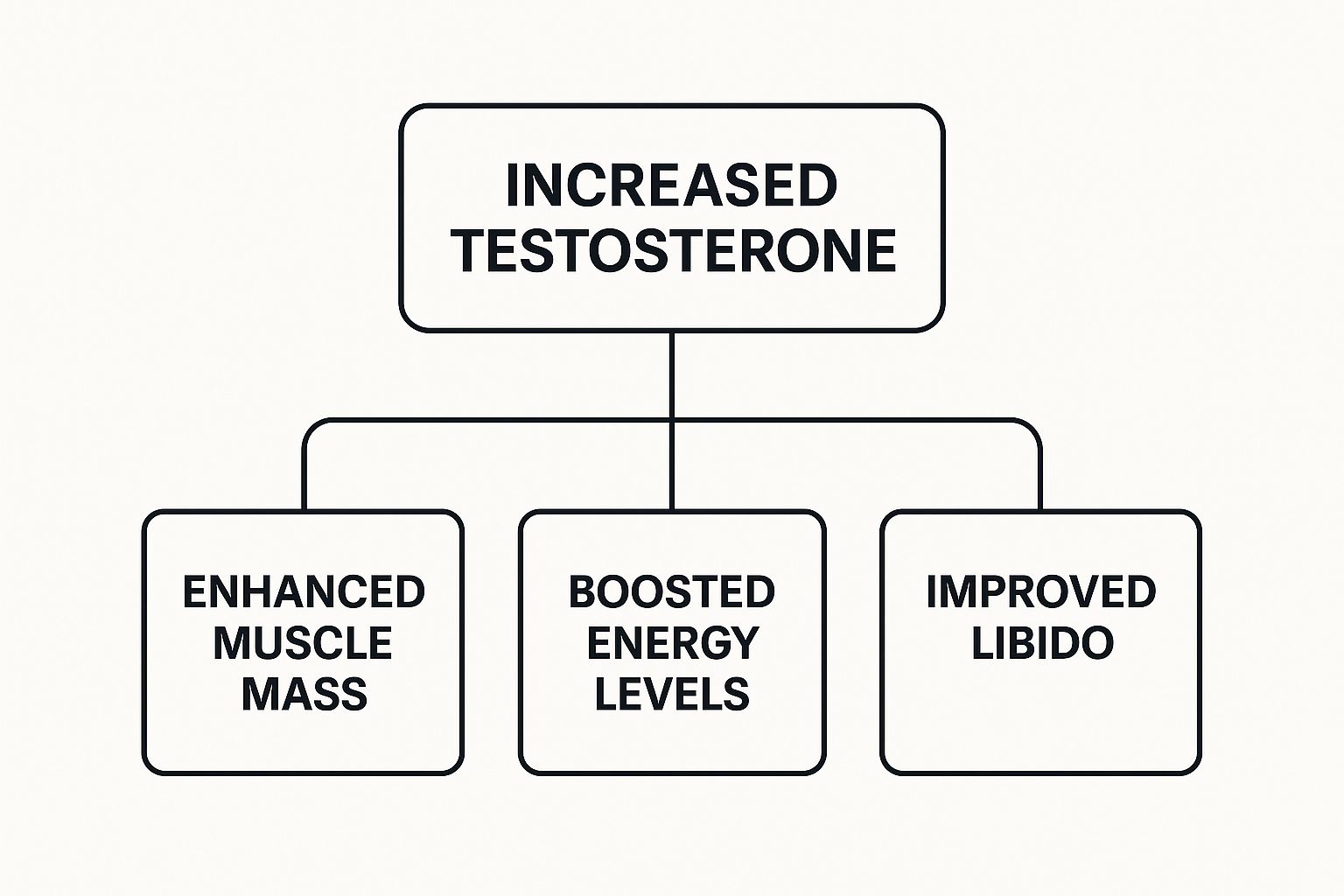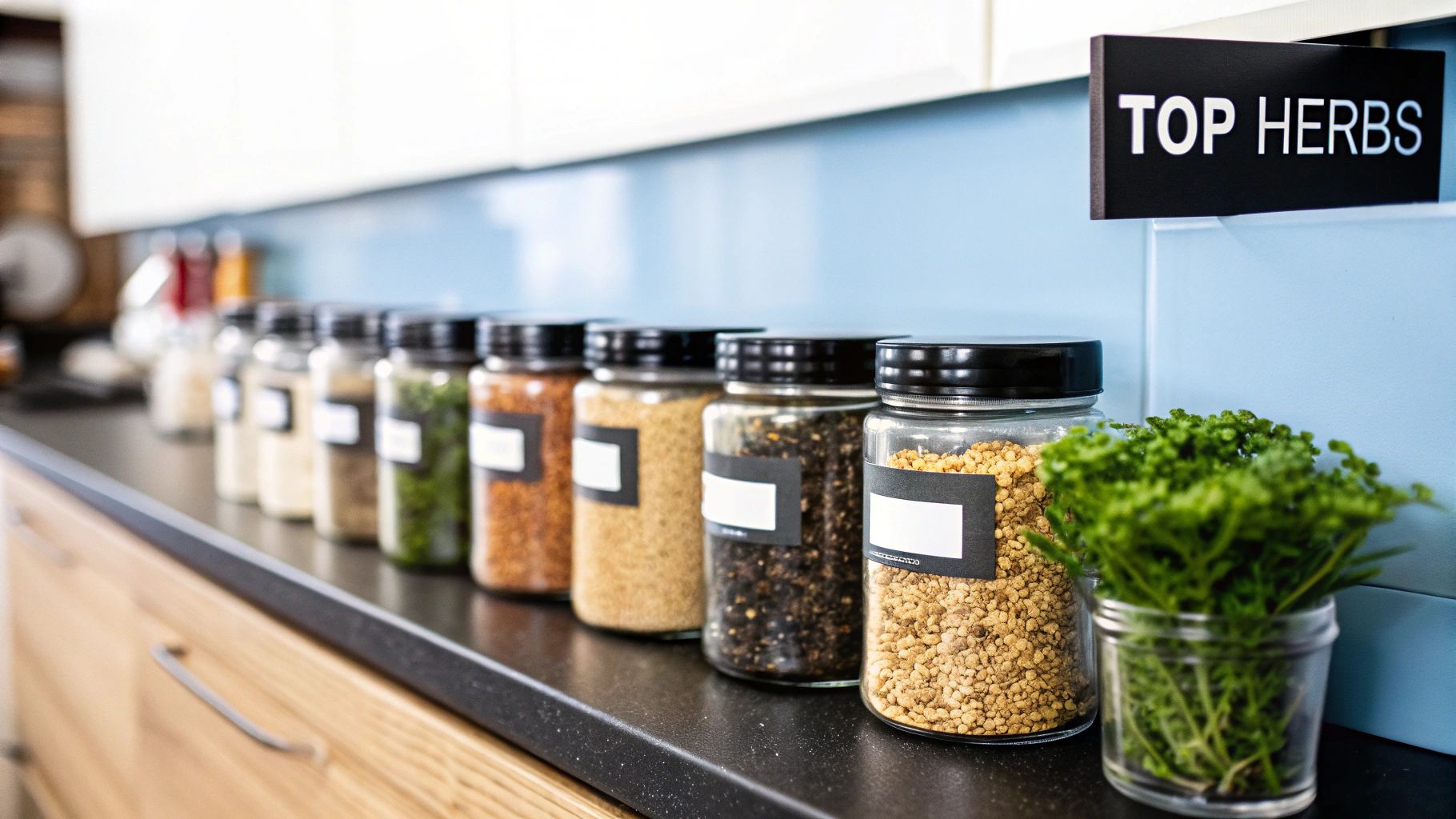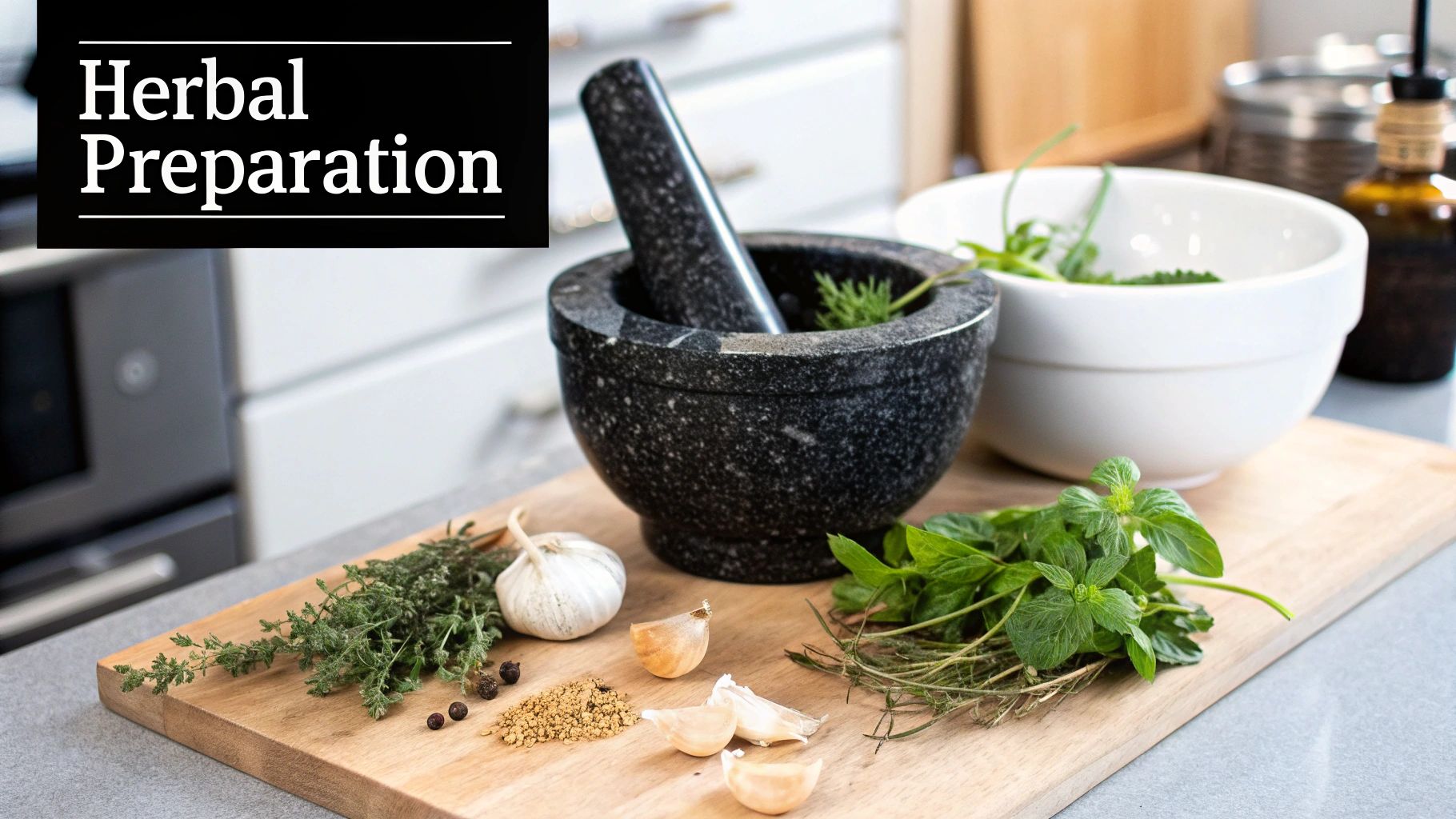When you hear about the best natural testosterone booster herbs, we're really talking about powerful botanicals like Ashwagandha, Tongkat Ali, and Fenugreek. These aren't synthetic hormones in a bottle. Instead, they work by supporting the very systems your body already has in place for hormone production, helping to manage stress and optimize communication between your brain and endocrine glands.
Why Modern Men Seek Natural Testosterone Support

There's a noticeable shift happening in men's health. More and more men are looking past synthetic solutions and turning toward plant-based, natural ways to maintain their vitality. It’s all about finding strategies that work with the body, not against it.
Testosterone is far more than just a "male hormone"; it's a cornerstone of a man’s overall well-being. It influences everything from daily energy and muscle mass to mood and libido. When your levels are where they should be, you feel focused, strong, and ready to take on the day. But life gets in the way—age, chronic stress, and lifestyle habits can all throw this crucial hormone out of balance.
Understanding the Role of Herbs
This is where herbs come in. Natural testosterone boosters work on a simple, elegant principle: they don't pump your body full of external hormones. Think of them more like a support crew for your body's own hormone-producing factory, helping the machinery run smoothly and efficiently. The entire approach is geared toward restoring balance from within.
This preference for natural solutions isn't just anecdotal; the numbers back it up. The global market for these supplements was valued at an impressive USD 3.78 billion in 2024 and is expected to more than double by 2032. Herbal options like Tongkat Ali and Ashwagandha make up nearly half of that market, which speaks volumes about the growing trust in their safety and effectiveness.
The goal isn't to artificially inflate hormone levels. It's to provide the botanical support your body needs to maintain its own healthy, natural production. This is the core philosophy behind using herbs for hormonal wellness.
To get the full picture of male hormone health, it’s worth exploring all the different strategies available. This guide on how to boost testosterone naturally provides a great overview. Here, we'll dive deep into the specific herbs leading the charge in modern men's wellness.
The Most Effective Testosterone Booster Herbs
When you start looking into natural ways to support testosterone, you’ll find yourself digging into ancient botanicals that are now getting serious attention from modern science. The real key is knowing which herbs have solid evidence behind them. Here, we'll walk through the heavy hitters: Ashwagandha, Tongkat Ali, Fenugreek, and Shilajit, and break down exactly how they work.
There's a good reason the market for these powerful plants is booming. Back in 2025, the global herbal testosterone booster market was already valued at a staggering USD 1.5 billion, and it's only expected to keep growing. This trend shows a clear shift toward trusted, natural solutions that blend age-old herbal wisdom with modern scientific proof.
Ashwagandha: The Stress Reducer
Ashwagandha (Withania somnifera) is a true cornerstone of Ayurvedic medicine. For centuries, it’s been revered as an adaptogen—a class of herbs that helps your body adapt to and manage stress. Its link to testosterone is all about this stress-fighting ability.
Think of cortisol, your body's main stress hormone, as being in a constant tug-of-war with testosterone. When chronic stress keeps your cortisol levels high, testosterone production often gets suppressed. This is where Ashwagandha comes in. It helps bring cortisol back into balance, creating a much friendlier hormonal environment for testosterone to flourish.
In one compelling study of men dealing with high stress, those who took Ashwagandha root extract for three months saw a significant 15% increase in testosterone levels compared to the placebo group.
This really drives home Ashwagandha's role. It isn't just a direct T-booster; it's a masterful hormonal balancer. On top of that, its ability to improve sleep and reduce anxiety contributes to an overall sense of vitality.
Tongkat Ali: The Libido Enhancer
Tongkat Ali (Eurycoma longifolia), often called Longjack, is a plant native to Southeast Asia with a well-earned reputation as a traditional aphrodisiac and energy booster. And now, clinical research is catching up to its long-standing reputation.
This herb’s magic lies in its ability to help free up "bound" testosterone. A large portion of the testosterone in your body is latched onto a protein called Sex Hormone-Binding Globulin (SHBG), which keeps it inactive. Tongkat Ali is believed to lower SHBG levels, which essentially unlocks more of your existing testosterone, making it biologically active and ready for your body to use.
It also helps keep cortisol in check, giving it a one-two punch similar to Ashwagandha but with a stronger lean towards improving libido and physical performance. The infographic below shows just how these benefits stack up.

As you can see, optimizing testosterone can translate into real-world improvements in muscle, energy, and sexual health.
Fenugreek: The Metabolic Supporter
You might know Fenugreek (Trigonella foenum-graecum) as a common kitchen spice, but it has a long history in alternative medicine. Its seeds are packed with compounds called furostanolic saponins, which are thought to be the source of its effects on male hormones.
Fenugreek’s main job seems to be inhibiting the enzymes that convert testosterone into estrogen—specifically, aromatase and 5-alpha reductase. By slowing down this conversion, it helps keep more free testosterone circulating in your bloodstream where it belongs.
- Aromatase Inhibition: This action reduces how much testosterone gets turned into estrogen.
- 5-Alpha Reductase Inhibition: This may limit the conversion of testosterone into dihydrotestosterone (DHT).
This dual-action approach makes Fenugreek a staple in many men's health formulas. For those looking for a well-rounded supplement, products like the Smash Torque T Booster often include herbs like Fenugreek in their blends. While Fenugreek is a powerhouse on its own, its benefits can also support fertility; feel free to dive deeper by reading about the best herbs for fertility in our other guide.
Shilajit: The Mineral Powerhouse
Shilajit isn’t your typical herb. It's a potent, tar-like resin that seeps from rocks in the Himalayan mountains, formed over centuries from the slow decomposition of plants. This unique substance is incredibly rich in fulvic acid and contains over 84 different minerals.
Its main benefit for testosterone comes from this incredibly dense nutritional profile. Shilajit is believed to boost the function of mitochondria—the "power plants" inside your cells. Better mitochondrial function means more energy and healthier cells overall.
Research has shown that purified Shilajit can significantly raise both total and free testosterone levels in healthy men. By flooding the body with a wide array of micronutrients, it supports the very foundation of hormone synthesis. Think of it less as a direct stimulant and more as a foundational fuel that gives your body all the raw materials it needs to operate at its best.
To help you see how these herbs stack up, here's a quick comparison.
Comparing Top Natural Testosterone Booster Herbs
This table gives you a side-by-side look at what makes each of these herbs unique, from how they work to their typical dosages. It's a great starting point for figuring out which one might align best with your specific health goals.
| Herb | Primary Mechanism | Key Benefits | Typical Daily Dosage |
|---|---|---|---|
| Ashwagandha | Reduces cortisol (stress hormone) | Lowers stress, improves sleep, balances hormones | 300-600 mg of root extract |
| Tongkat Ali | Increases free testosterone by reducing SHBG | Enhances libido, improves energy & performance | 200-400 mg of extract |
| Fenugreek | Inhibits conversion of testosterone to estrogen | Supports metabolic health, maintains T levels | 500-600 mg of standardized extract |
| Shilajit | Provides rich minerals to support cellular energy | Boosts energy, provides foundational support | 300-500 mg of purified resin |
Remember, while this table offers a general guide, the right herb and dosage for you can depend on a variety of personal factors. Always consider consulting with a healthcare professional before starting a new supplement regimen.
How These Herbs Support Your Body's Hormones

It’s one thing to know which herbs can help, but understanding how they work is the real key to making smart, effective choices for your health. These herbs don't just magically conjure up more testosterone. Instead, they interact with your body’s complex hormonal network in very specific and supportive ways.
Think of your body’s hormone-producing command center—the hypothalamic-pituitary-gonadal (HPG) axis—as a symphony orchestra. Your brain is the conductor, sending precise signals to the instruments (your glands) telling them when to play and how loudly. The herbs we're discussing help fine-tune the orchestra, ensuring every section plays in beautiful harmony.
They do this by working along a few distinct, yet complementary, pathways.
Signaling for More Production
One of the most direct ways these herbs work is by prompting the brain to send clearer, stronger signals. The star player here is luteinizing hormone (LH), which is the specific messenger that travels to the testes with the instruction: "make more testosterone."
Herbs like Tongkat Ali, for instance, have been shown to encourage the pituitary gland to release more LH. It’s like the conductor telling the brass section to play with more power, ensuring the message to ramp up testosterone production is received loud and clear.
This isn't about creating an artificial spike. It's about optimizing the natural feedback loop your body already uses to regulate its own hormones, helping it run more efficiently.
This enhanced signaling gets your body's own production machinery working at its peak potential.
Managing Hormonal Competitors
Another critical job for these herbs is to manage other hormones that can get in testosterone's way. The biggest culprit is often cortisol, our primary stress hormone. When we're chronically stressed out, cortisol levels can stay high, which puts a direct damper on testosterone production.
This is where adaptogenic herbs like Ashwagandha really come into their own. They help the body build resilience to stress, preventing cortisol from constantly hogging the hormonal spotlight. By taming the stress response, they create a much more favorable environment for testosterone to flourish. Learning how to balance hormones naturally is a cornerstone of a holistic approach to wellness.
Freeing Up Existing Testosterone
Finally, some herbs help you make better use of the testosterone you already have. You see, a large amount of testosterone in your bloodstream is latched onto a protein called Sex Hormone-Binding Globulin (SHBG). When it's bound like this, it’s inactive and can't be used by your cells. Only "free" testosterone is biologically available to do its job.
Compounds in herbs like Tongkat Ali and Fenugreek can help lower SHBG levels. Think of this as unlocking the testosterone that's already in your system, which increases the amount of free, usable T without necessarily having to produce more from scratch.
By working through these three main channels—better signaling, stress management, and freeing up existing supply—these herbs act as true partners to your biology, supporting and optimizing the systems you already have in place.
Building a Foundation with Vitamins and Minerals

While the right herbs can be powerful allies for hormonal health, they don't work in a vacuum. To get the most out of them, you need to first make sure your body has all the raw materials it needs.
Think of it like building a house. You can hire the best craftsmen in the world (the herbs), but if they show up to a site with no lumber, bricks, or mortar (vitamins and minerals), they can’t get the job done. These micronutrients are the absolute bedrock of your endocrine system.
If you’re deficient in certain key nutrients, you create a major bottleneck in your body’s hormone production line. Even the most potent herbs will struggle to make a difference if they don't have the fundamental building blocks to work with.
This isn't just theory; it's a trend shaping the entire supplement industry. Vitamin and mineral-based formulas are now the fastest-growing category, projected to expand at an annual rate of 10.3% from 2024 to 2030. As more people recognize the impact of widespread nutrient gaps, the demand for these foundational supplements has skyrocketed. You can dig deeper into the numbers with these testosterone booster market trends at GrandViewResearch.com.
The Critical Micronutrient Trio
When it comes to male hormonal health, a few key players are absolutely essential. If you’re serious about supporting your testosterone, ensuring you have enough of these three is the non-negotiable first step.
-
Vitamin D: Often called the “sunshine vitamin,” it’s more accurately described as a pro-hormone. It has a direct influence within the testes, the very site of testosterone synthesis. Time and again, research has shown a clear and direct link between healthy Vitamin D status and higher testosterone levels.
-
Zinc: This mineral is a true powerhouse for male reproductive function. It’s a crucial component for producing luteinizing hormone (LH), which is the chemical messenger the brain sends to tell the testes to get to work. A zinc deficiency can directly stall this entire process.
-
Magnesium: This mineral is involved in over 300 different processes in the body, and that includes pathways that impact both total and free testosterone. Magnesium helps to keep Sex Hormone-Binding Globulin (SHBG) in check. By doing so, it “un-binds” testosterone, making more of it bioavailable for your body to actually use.
Just as a plant needs healthy soil to grow, your endocrine system needs a nutrient-rich environment to function optimally. Prioritizing these foundational elements makes every other effort, including herbal supplementation, significantly more effective.
Practical Steps for a Strong Foundation
Food should always be your first line of defense. Oysters and lean beef are zinc-packed powerhouses, as are beans and lentils. For magnesium, think leafy greens like spinach, and nuts like almonds and cashews. To boost your Vitamin D, fatty fish like salmon and tuna are excellent choices, along with getting some sensible, regular sun exposure.
But let’s be realistic—modern diets and indoor lifestyles often leave us falling short. If you suspect you might not be getting enough, or if you live in a climate with limited sun, a high-quality supplement can be a smart, practical way to ensure your hormonal foundation is truly solid.
Safely Using Natural Testosterone Boosters
When you start exploring natural herbs to support your testosterone, it's smart to approach it with a clear, safe strategy. These botanicals can be incredibly powerful, but they deliver the best results when used responsibly and with a solid understanding of your own health.
The first, and most important, step? Always talk to a healthcare professional.
Getting advice from a qualified practitioner turns a guessing game into a strategic, personalized plan. They can help you pick herbs that actually align with your health goals, making sure they won't interfere with any medications you're taking or conditions you have. Your health is unique, and your supplement plan should be, too.
Navigating Quality and Dosage
Once you’ve got that professional guidance, the next step is finding high-quality products and using them the right way. The reality is, not all supplements are made equal. The potency and purity can swing wildly from one brand to another.
Here’s what to look for:
- Standardized Extracts: This is a big one. It guarantees you're getting a consistent and effective amount of the active ingredients in every single dose.
- Third-Party Testing: Look for seals from independent organizations like NSF or USP. This is your proof that the product is free of contaminants and that what’s on the label is actually what’s in the bottle.
- Follow Dosage Guidelines: It's always wise to start on the lower end of the recommended dosage. See how your body feels and responds before even thinking about increasing it.
Think of taking herbs like tuning a guitar. Too little tension on the strings and you get no sound. Too much, and the string snaps. Sticking to the guidelines helps you find that perfect pitch for your body's optimal, safe range.
Some experts also suggest cycling your herbs. This means you might take an herb for a specific period, say eight weeks, and then take a short break. This can prevent your body from getting too used to the herb, helping it stay sensitive to its effects for the long haul.
It's also helpful to see the bigger picture of men's health, including how these herbs might interact with other areas like prostate wellness. You can dive deeper into that in our guide to the best herbs for prostate support. Taking these well-informed steps allows you to use these natural tools both safely and effectively.
Got Questions About Herbal Testosterone Support? Let's Clear Things Up.
When you start digging into natural ways to boost testosterone, a lot of practical questions naturally come up. It's smart to wonder about how long it takes to see results, what the safety profile looks like, and how these herbs stack up against conventional medical treatments.
Getting clear, straightforward answers is the first step to making a decision that feels right for you. Here are some of the most common questions I hear from my clients.
How Long Does It Take to Actually Feel a Difference?
This is probably the number one question, and the answer is simple: you have to be patient. Unlike a prescription drug designed for an immediate effect, these herbs are working to support and rebalance your body's own intricate systems. That process doesn't happen overnight.
While some guys report feeling a subtle lift in their energy or mood within a few weeks, the more significant changes—like in the gym or with your libido—usually take a bit longer. A good rule of thumb is to expect eight to twelve weeks of consistent use before you can really gauge the effects. Your starting point matters, too; factors like your baseline hormone levels, diet, sleep, and stress all influence how quickly your body responds.
Are These Herbs Safe to Take for a Long Time?
For the most part, yes. Herbs with a long history of use and modern research behind them, like Ashwagandha and Fenugreek, are generally considered safe for long-term use in healthy adults, as long as you stick to the recommended dosages.
That said, I often recommend cycling certain supplements. Think of it as giving your body a little reset. You might take an herb for two or three months, then take a one or two-week break. This can help prevent your body from getting too accustomed to the herb, ensuring it stays effective over time. Of course, the best approach is always a personalized one, so talking this over with a healthcare professional who knows your history is the wisest move.
The core difference is fundamental: Herbal boosters act as a support crew for your body's natural hormone production, while TRT is a medical intervention that introduces external, synthetic hormones to override it.
How Do These Herbs Compare to Something Like TRT?
This is a crucial point, and it’s important not to confuse the two. Natural testosterone boosters and Testosterone Replacement Therapy (TRT) are fundamentally different approaches.
- Herbal Support: Think of herbs as coaches for your endocrine system. They work with your body to help it do its job better. They might help lower stress hormones like cortisol that get in the way, improve the signaling from your brain to your testes, or help free up testosterone that's already in your system. The goal is always to optimize your body's own natural production.
- Testosterone Replacement Therapy (TRT): This is a medical treatment for a diagnosed condition like hypogonadism. TRT doesn't fix the root cause of low production; it simply replaces the testosterone your body isn't making by introducing an external source through injections, gels, or patches.
The choice between them isn't an "either/or" for most people—it comes down to your individual health status, lab results, and personal goals.
At Eric Tsai Acupuncture and Herbs, we specialize in creating personalized wellness plans that integrate the wisdom of Traditional Chinese Medicine with modern health insights. If you're ready to explore a balanced, natural approach to supporting your vitality, we invite you to schedule a consultation with us today.

